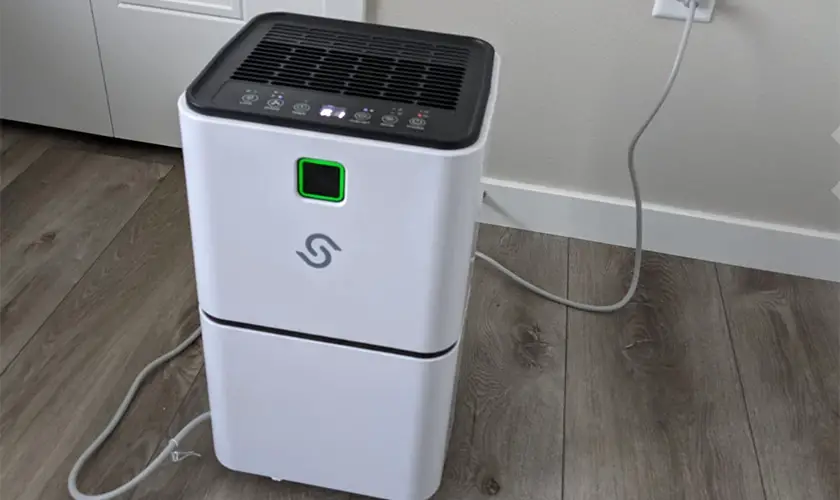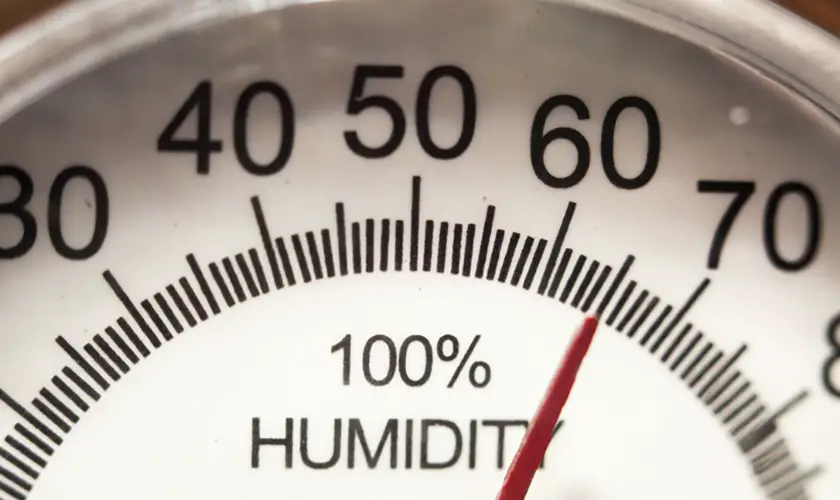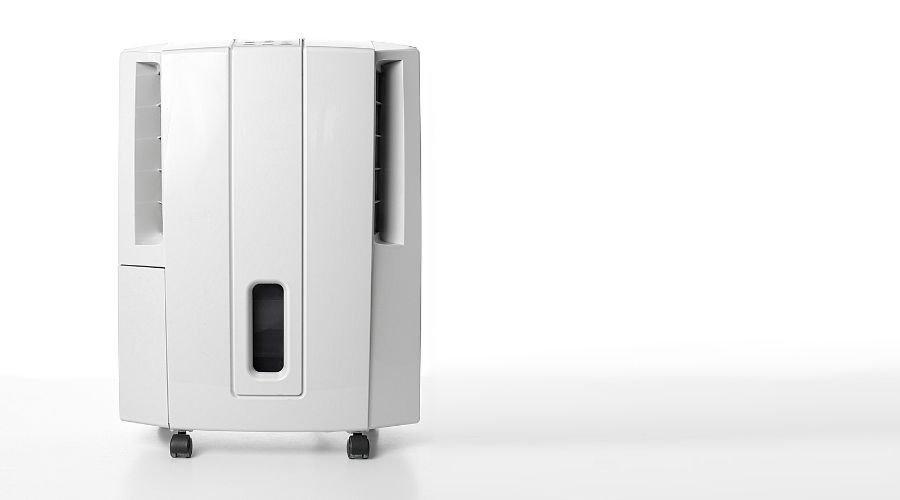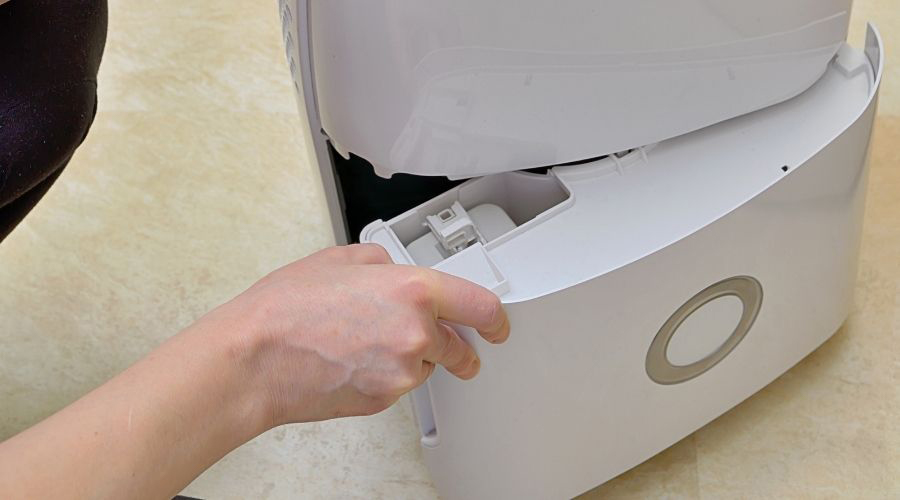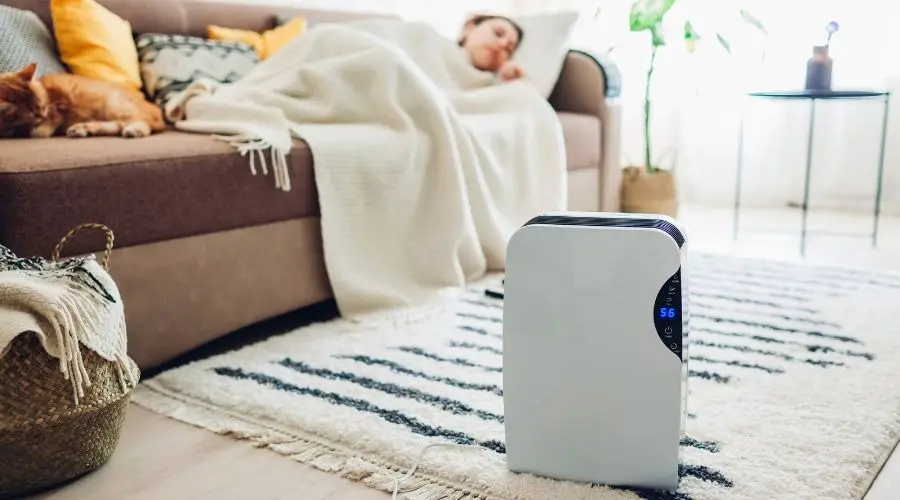
Attempting to get a good night’s sleep is something that we all innately long for. Sleep is so refreshing that we can physically and mentally feel the benefits of the night’s rest.
What about controlling our sleeping environment and altering that rest experience? We often ask what changes we can make to improve our sleeping experiences. Conversely, what choices we make are actively making it worse.
Well, that is where the dehumidifier comes in. One might ask if it is okay to sleep with the device in a bedroom.
In short, it is perfectly safe to sleep with a dehumidifier on. If you are someone who likes white noise, then it will be even more beneficial to you.
However, there may be some circumstances that you might want to be aware of before immediately sleeping with your dehumidifier next to you.
Today we will be addressing whether or not sleeping with your dehumidifier can be beneficial, harmful, or essentially non-impactful.
What is a Dehumidifier?
Before we dive deep into this, let’s chat about what a dehumidifier is for those who may not be too familiar with this delightful little device.
At its most base definition, a dehumidifier is a machine that takes excess moisture from the air. It actively reduces your home’s (or any other location you have one active in) humidity level.
A dehumidifier stabilizes it to keep any potential unwelcome guests like bugs and the like at bay and serves as a health benefit to boot.
A dehumidifier can stabilize humidity within your home, which actively combat mold from forming in your walls and free the area from other potentially harmful allergens.
Now that we’ve gotten a decent grasp of a dehumidifier and its functions, we’ll move forward with the topic. We will also investigate whether it is good to sleep with your unit running or if the process can be more harmful than good.
Is it Good to Sleep With a Dehumidifier?
Putting your best foot forward, we will lead with the question at hand.
The answer is based entirely on a few precise instances. You’ll want to strike the perfect medium between using your dehumidifier appropriately and not overdoing it so much so that you leave the air stagnant and dry.
Example 1:
If you worked with the ideology that you planned on utilizing the dehumidifier in a circumstance that allows it to do its job without removing too much moisture from the air, then yes. In that case, you can sleep with the dehumidifier on.
Example 2:
Whether or not this benefits you is, as we said, an open-ended variable. If your house had an overall humidity level above 50%, you would want to sleep with it to reduce the chances of mold growing in your home. Keeping it on improves the overall air quality by association as well.
Example 3:
On the other hand, running your unit overnight may allow the opposite. Suppose your home is already at that perfect humidity level of roughly 30-40% in the cold season and 30-50% in the warmer seasons.
In that case, it can welcome bugs that prefer lower moisture levels. The same might be said of mold and other allergens.
Can You Leave a Dehumidifier On All Night?
Technically you can leave a dehumidifier on all night. However, you want to make sure you are getting the most out of your unit and not overusing it to the point where you or the device itself are suffering from the act.
Built-in On & Off Switch
Modern dehumidifiers come with built-in humidistats that allow you to set the level of humidity you want to achieve while it is on. Utilizing this, you can ensure you aren’t overusing your unit.
Another benefit most dehumidifiers have would be the built-in off switch that will turn your unit on when the room or house’s humidity levels have met.
This feature is an absolute must-have when shopping for your next dehumidifier. Not only will it save you money, but it removes any potential adverse side effects of leaving your unit on overnight.
Noise Levels
One final thing to consider is the overall noise level emitted from your unit as it works its magic throughout your household.
In some instances, the device itself isn’t very loud. Still, suppose you traditionally turn your lights off throughout your home and have it nearly wholly silent.
In that case, it will make audible noise, so if you are a light sleeper, having your dehumidifier on overnight may be a rather complicated subject.
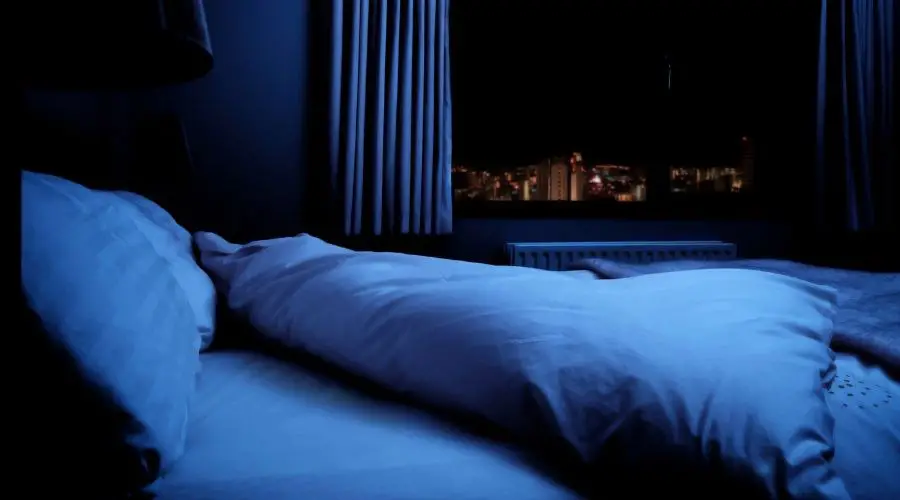
How Can a Dehumidifier Help Me Sleep Better?
Dehumidifiers can most definitely help you sleep better, especially if you suffer from any of the following:
- Numerous reactions to harmful allergens
- Sweat rather intensely during your slumber
- You cannot seem to get comfortable.
A dehumidifier can prove to be just the solution you are looking for.
People who have difficulty breathing at night would gain an increased sense of security knowing that the dehumidifier will make the air lighter.
The dehumidifier removes excess moisture from the air and, by association, makes it easier to breathe and less weighty on your lungs.
Another way a dehumidifier can help you sleep is that it will help you not to sweat. If you are a person who wakes up drenched in sweat, then you no longer need to worry about this issue.
Their newfound friend, the dehumidifier, will help drastically. Thus, reducing the likelihood of them sweating at all and allowing their air conditioner to work more efficiently by the same token.
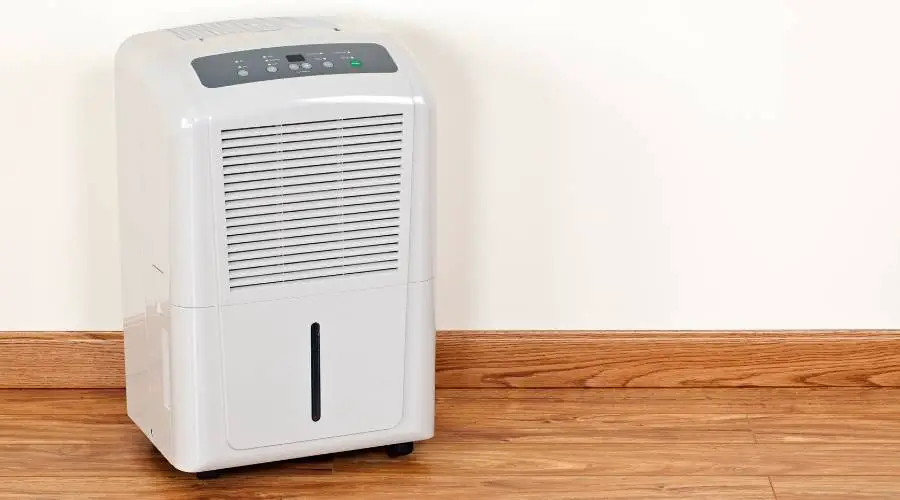
Where is the Best Place for the Dehumidifier?
Finding out the perfect place for your dehumidifier can be a touchy subject. Having good placement is due in no small part. Thanks to its position, having a massive impact on how well it functions and the amount of effort required from your unit to achieve the same result.
Placement in the Corner of the Room
If you were to place your unit in the corner of a room, the unit would struggle to pull air from the furthest reaches of the house. The dehumidifier would then work twice as hard, attempting to lower the overall humidity of your home. It is especially true if you want to dehumidify your entire home.
Placement in the Middle of the Room
On the other side, if you placed your unit directly in the middle of the house, it could easily regulate the airflow and handle the job much more quickly and efficiently. Having a dehumidifier in the middle of your home or room saves you time and money.
Make Sure Not to Cover Anything
Suppose the dehumidifier is backed into a wall. In that case, you may be covering one of the many exhaust ports or fans. Having these fans covered can disrupt the unit’s airflow and cause the same struggle as if you had crammed it into the corner of your house.
Ideally, the perfect spot for you to place your dehumidifier would be in the center of your home, with roughly six inches of space on all sides of your unit. Having this will guarantee it has ample room in both directions and takes in air from all areas.
Be sure that when you are placing your unit in the ultimate spot, you make sure it isn’t a trip hazard. Having a humid-free household means nothing if you put yourself into the hospital trying to get a drink of water at night!
Source of Humidity
Whether conscious of it or not, a few constants in our lives generate quite a substantial amount of humidity in our homes. These things may be the following:
- Showering
- Cooking
- Having household plants within your home
- Drying clothes
- Washing dishes with warm water
- Other daily activities
Example 1: Showering
When you shower, the constant stream of steam from your bathroom will gradually cause the humidity level of your house to rise.
The moisture caps itself out when you open the bathroom door afterward and release the gust of hot, humid air throughout the house.
You can partially mitigate this by having a fan pointed towards the door when you open it.
Another option is to have the window in your bathroom slightly cracked when you are showering, assuming you have one in the first place.
Example 2: Cooking
We all have to cook food to eat. The heat from the oven and the vapors from food cooking increase the humidity and showering.
However, most stove/oven setups have built-in fans above them to eliminate or at the very least combat this excess heat build-up.
Doing so will make cooking more enjoyable and better distribute the aromas throughout your home. Generally speaking, it is a benefit unless you are making something that smells pleasant.
Example 3: Household Plants
Household plants make this list primarily because they generate a certain amount of heat among themselves.
Keeping plants in the home may be negligible to some people. However, if you are a collector of plants, make sure to open your windows before going to bed routinely to make the house a bit less humid.
You will want to ensure your dehumidifier is stationed very close to any of these points of interest if they are more pertinent to you.
Above all, keeping your unit in the center of your home while appealing to these other causes will ensure your home remains humid-free for the time. Keeping your house humid-free grants you better sleep by association.
Size of the Room
As a general rule of thumb, the larger the size of your room, the harder it is to lower its humidity. By association, you will need a dehumidifier big enough to handle the job. Not all dehumidifiers are built equal.
In most cases, they come in various sizes, with builds primarily geared at one or two different purposes.
As such, you must take the time to measure the size of the room you are putting your unit in. You’ll also want to check for the maximum capacity your dehumidifier can handle.
Finding out the exact size needed for your home boils down to the following:
- The size of the room usually measures in square feet.
- The average humidity of the room, which you can find out with a hygrometer.
- The temperature of the room itself.
These three factors break down the basic knowledge required to purchase a perfect dehumidifier for you and your home.
Keep the Airflow Going
Controlling the airflow of your home is an absolute must. That is if you want to make the most of your dehumidifier, relieve some stress on the unit, and increase its lifespan.
Now you may ask yourself, what can I handle, something as flippant as airflow? The answer is relatively simple, which is to use fans.
When you use a fan, you are redirecting air to a specific location, wherever the fan is pointed.
Suppose you set a fan at the end of your home and tell it at a doorway leading towards where you’ve placed your dehumidifier.
In that case, you’ve created a tight little current that will carry humid air from that room directly towards your unit and make the process much faster by that same understanding.
Considering the above, the next logical step would be strategically placing a few fans around your home, preferably at the opposite ends of your home, pointing inward. What you will accomplish is:
- Accelerate the process entirely.
- Save yourself some money.
- Guarantee your dehumidifier gets the job done faster. It would have taken much longer without fans than with them, meaning you managed to work towards your goal more quickly!
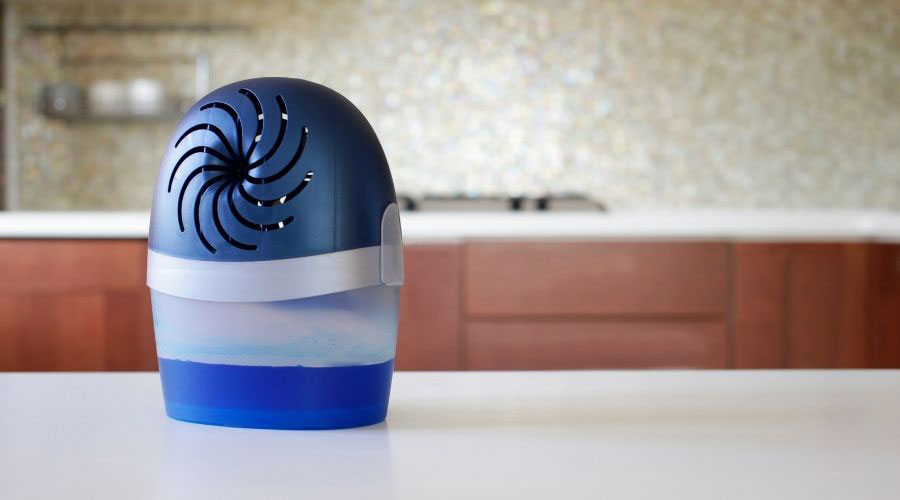
Where is the Best Placement for a Dehumidifier in a Bedroom?
Traditionally, you wouldn’t want to put a dehumidifier directly in your bedroom because bedrooms aren’t particularly prone to being excessively humid.
Still, one key factor can rearrange that entire structure. Suppose you happen to have cracks around your window or damaged windows themselves.
The humidity from outside can waltz directly into your bedroom and dramatically change the overall moisture levels in your home.
To combat this, you would want to purchase a dehumidifier that can not only control this issue but do so in a manner that isn’t drying out the entire house by association. For that, you’d want to purchase a relatively smaller unit that would only affect your bedroom.
As discussed above, a few variables to keep in mind with this setup would be that your dehumidifier needs room for proper airflow. The tank of your dehumidifier will eventually fill with water and need to be emptied at some point.
This is inevitable, so don’t make the chore more taxing than it has to be. Position your dehumidifier so that it can be handled with relative ease.
However, ensure the unit itself isn’t near any electronics that the dehumidifier can damage in the event of a spill or leak.
Advantages & Disadvantages of a Dehumidifier
Undeniably there is a wide array of pros and cons to anything we can do in life, and making use of a dehumidifier is in no way an exception to this rule. Below you can see a graph of the pros and cons of using one in your home and whether or not it is beneficial to sleep with one knowing these possibilities.
| PROS | CONS |
|---|---|
| Creates healthy environments | You have to stay hydrated |
| May help control asthma | It makes the air dryer |
| Reduces allergy signs | Some health conditions may worsen, like pneumonia or dry coughs. |
PROS:
1. Creates Healthy Environments
Controlling the tide of unwanted allergens, lightening moisture levels in the air, and fighting off mold infestations mean your home will be a more healthy place to level in.
It ensures you are more comfortable with the effort involved in setting it up, leading to a much more pleasant sleeping experience.
2. May Control Asthma
A higher quality of air can potentially reduce the effort required for your lungs to supply air to your body. It helps control asthma and prevent potential attacks from occurring.
Dehumidifiers helping to control asthma have not been scientifically proven yet, but it is worth mentioning.
3. Reduces Allergy Signs
Dehumidifiers function as make-shift air purifiers, drastically reducing allergic signs and reactions.
Because they are running air in your home through a series of filters, dehumidifiers remove dust and other unwanted particles and allergens from the air.
CONS:
1. You Need to Drink Water
Since dehumidifiers remove humidity from the air, it stands to reason that the newfound lack of moisture can make the air we breathe drier.
Dehumidifiers require us to personally be more active in consuming water to remain hydrated throughout the night. If you aren’t a clumsy person, you can keep a glass of water on your nightstand. Otherwise, you can use a cup that contains a lid on it.
Make sure to have one ready before bed in your refrigerator so you can get your nightly sip of water and return to a peaceful slumber.
2. The Air Gets Drier
As we mentioned above, dehumidifiers make the air drier and require you to combat that appropriately.
This may mean extra effort to hydrate yourself. Some examples are using different conditioners to keep your hair from fraying too much or even utilizing skin lotions to keep your skin from drying out and flaking.
3. Some Health Issues May Worsen
You may suffer from having a dehumidifier overnight to the extent that you may want to consider leaving it off or not having one in the first place.
Of course, this depends entirely on what you have going on in your personal life and your overall health condition.
If you are unsure if it is safe to have one in your home, it’s always wise to consult your doctor to see if your condition or medication can have complications with arid air.
Final Word
Utilizing dehumidifiers when you are sleeping is safe. It can be highly beneficial, assuming you don’t have pre-existing medical conditions that can harm you in the long run.
If you want to sleep with your unit on, be sure that it has the built-in off switch so that your team turns itself off when the desired humidity level has been hit. Having an off switch ensures nothing terrible can befall you in your slumber.


